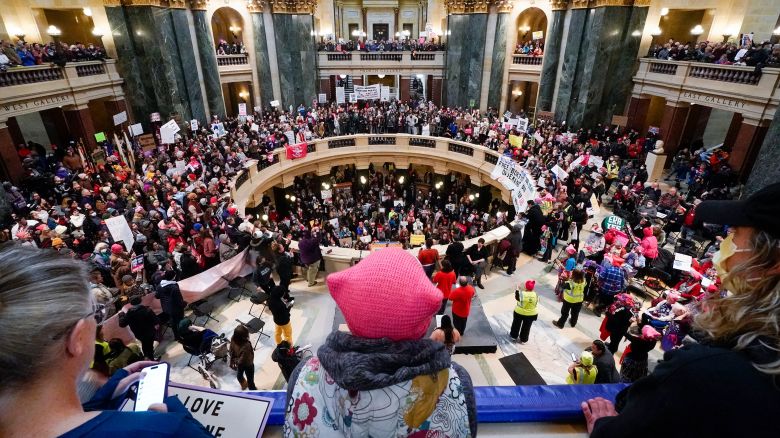The Wisconsin Supreme Court has made a historic ruling that has shattered the shackles of a 176-year-old abortion ban, invalidating the draconian law from 1849 that had threatened the lives and autonomy of countless individuals. This landmark decision comes on the heels of the U.S. Supreme Court"s 2022 reversal of Roe v. Wade, which had sent shockwaves through reproductive rights advocacy, reigniting fierce debates across the nation.
Historic Context of the 1849 Law
Wisconsin"s 1849 abortion ban was one of the most severe in the nation, imposing a potential six-year prison sentence and a hefty $10,000 fine on anyone other than the pregnant person who “intentionally destroys the life of an unborn child.” The only exception under this archaic law was for situations where the pregnant person"s life was at risk. With the law effectively dormant for decades, it became a relic of a bygone era, overshadowed by more contemporary legislation that recognized the complexities of reproductive health.
Impact of the Court"s Ruling
This ruling is not merely a legal victory; it represents a significant step toward restoring reproductive rights in Wisconsin. Justice Rebecca Dallet"s opinion emphasized that comprehensive legislation enacted over the past 50 years has created a framework that effectively rendered the 1849 ban obsolete. According to Justice Dallet, the modern laws cover the “who, what, where, when, and how” of abortion, reinforcing the fundamental right to choose.

Appeals court sides with Wisconsin governor on press access ...
Political Landscape Post-Roe
Since the U.S. Supreme Court"s decision to overturn Roe v. Wade, states have been thrust into a chaotic landscape of conflicting laws and regulations surrounding abortion access. Wisconsin"s legal battles reflect a broader national crisis, where reproductive rights are increasingly at risk. Governor Tony Evers and Attorney General Josh Kaul"s successful lawsuit to invalidate the 1849 law highlights a pivotal shift in Wisconsin"s political landscape, emboldened by a Supreme Court that now leans toward a liberal majority.
Voter Mobilization and Judicial Change
The election of Justice Janet Protasiewicz, who campaigned on a platform of supporting abortion rights, played a crucial role in this outcome. Her victory signals a shift in voter sentiment, showing that Wisconsinites are mobilizing to protect reproductive freedoms. The court"s decision to hear a separate lawsuit filed by Planned Parenthood of Wisconsin reinforces this momentum, as advocates seek to establish equal protection under the state Constitution for abortion access.

Abortion news and the latest on reproductive rights in the United ...
Broader Implications for Other States
Wisconsin"s ruling sets a powerful precedent, especially as other states grapple with similar pre-Roe abortion bans still lingering in their legal systems. According to reports, Michigan successfully passed a ballot measure to enshrine abortion rights in its state Constitution amidst similar concerns. In Arizona, voters also approved measures to protect abortion rights, illustrating a significant trend where states are taking proactive steps to safeguard reproductive choices in the face of federal uncertainties.
This ruling in Wisconsin serves as a clarion call for advocates nationwide, emphasizing the power of grassroots mobilization and the critical importance of judicial appointments. The fight for reproductive rights is far from over, but the invalidation of the 1849 ban demonstrates that progress is possible even in the most challenging political environments.

![[Video] Anti-ICE Protester Pepper Sprayed as CBP Agents Disperse Crowd in Minneapolis](/_next/image?url=%2Fapi%2Fimage%2Fthumbnails%2Fthumbnail-1768260677127-y71sb7-thumbnail.jpg&w=3840&q=75)

![[Video] Several injured as U-Haul truck drives through Iranian protestors in Los Angeles](/_next/image?url=%2Fapi%2Fimage%2Fthumbnails%2Fthumbnail-1768176682028-q95y6j-thumbnail.jpg&w=3840&q=75)
![[Video] Scuffle breaks out between Trump supporters and Anti-ICE protesters in Times Square](/_next/image?url=%2Fapi%2Fimage%2Fthumbnails%2Fthumbnail-1768165958203-hgcgb-thumbnail.jpg&w=3840&q=75)


![[Video] Gunfire between Iraqi security forces and Sadr militias in Baghdad](/_next/image?url=%2Fapi%2Fimage%2Fthumbnails%2Fthumbnail-1768343508874-4redb-thumbnail.jpg&w=3840&q=75)
